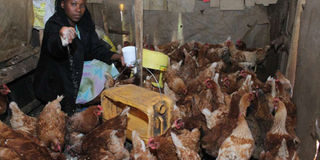DIARY OF A POULTRY FARMER: That poultry deal sounds too good? Please run for life

Ms Caroline Njoki feeds her 100 layers at Salama Farm in Elburgon,Nakuru County. PHOTO | JOHN NJOROGE | NMG
What you need to know:
- Never send money or give out personal information in response to an unexpected request
- Another lesson is that scammers do their home work and you have to be vigilant to beat them at their own game.
Last week on Sunday, I got a text message from one H.E Dr Griffith, who allegedly heads the United Nations Development Programme (UNDP) mission in Kenya.
“We do wish to support you in your poultry farming efforts,” he wrote.
“Can we endorse you for an Award in the Superior Interests of our Mission in Kenya or do we give you an elective attachment to work with UNDP?”
I was, to say the least, thrilled by his offer. Working for the UN as an advisor is a godsend and my mind immediately transited to cloud-cuckoo land.
I saw myself living in a wealthy neighbourhood rubbing shoulders with diplomats in sprawling houses with tall wrought-iron gates, well-manicured grass and waking up to the chirping sound of birds, not the honking noise of matatus.
If you recall, I’d shared that success also involves some luck in that you’ve to be in the right place at the right time and capitalise on opportunities when they come your way.
Deep down, I felt that Lady-luck had finally smiled my way and my fledgling poultry business.
Monday morning, the first thing I did was to call Dr Griffith. “We got your contacts from Egerton University, and it would be a pleasure for you to work with us,” he said.
I discerned that this was a genuine offer and I asked him to write me a formal letter for the offer.
Two hours later, I got this message from one Ahunna Eziakonwa-Onochie, the UNDP Resident Representative and UN Humanitarian Coordinator to Kenya.
“We’ve been in a board meeting and your name has been proposed for your Elective-Attachment to the UN Diplomatic Service Corps by H.E Griffith Memela, former S.A High Commissioner to Kenya and diplomat to this Mission.”
Save the careless capitalisation of some letters, I didn’t suspect anything.
But then this bombshell followed, “We request you to place a security bond of Sh5,000 with the UN Board Secretary Ms Juster Mukubio.”
I was given a mobile number to send the money and this raised a red flag.
A few hours later, Dr Griffith was on the phone again enquiring why I hadn’t responded to his once-in-a lifetime opportunity.
When I reminded him about the formal letter I’d requested from him, he said as a matter-of-factly that only his junior staff write emails. At that point, I knew this was a con-game, and I decided to ignore the texts messages, which continued coming in nevertheless.
Now, I’ve come to learn a few things about dealing with scammers, scoundrels, imposters and con artists.
One thing is never send money or give out personal information in response to an unexpected request — whether it comes as a text, a phone call, or an email.
Another lesson is that scammers do their home work and you have to be vigilant to beat them at their own game.
I’m lucky they didn’t get their way this time, but I’m worried that they may try next time or are prowling other farmers.





